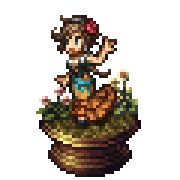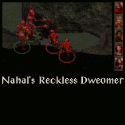|
Arrrthritis posted:Some neurons have been firing for a campaign and I thought I'd ask this thread a couple questions. So basically, I am a very lazy GM. I don't want to spend hours away from table cooking up something that the PCs might instantly destroy, take no interest in, or maybe even never hear about depending on how the campaign goes. That's just a waste of time, and even worse a temptation to railroad them toward that stuff even if they don't care about it, just to justify the time I sank in. And giving your players a multi-page infodump is basically how you ensure no one reads it, in my experience. So I cheat by offloading as much work as I can onto the players, which in many cases involves letting them create parts of the setting before play (usually OOC, but now that I think of it IC might be a cool thing to do in games with those kind of large-scale-project rules). And yeah, I have found that if you start the campaign in a city and spend a lot of time there, the players will often be reluctant to leave. There are games with specific rules/procedures for this, which may be helpful even if you're not running those games themselves; off the top of my head I can think of the Dresden Files RPG, and Microscope is actually an entire game about specifically cooking up an entire history from scratch (it's also kinda role-playing optional). Now, this method does eliminate much of the thrill of discovering new parts of the setting during play, but I've had more than enough games where stuff I made just went undiscovered so I'm happy to err on the other extreme for a while. In this specific case, I'd probably give your players the same pitch you just gave us, then maybe give each of them dibs over a specific city and let them contribute ideas or even work up the whole thing, depending on how into it they are. Then maybe you take all those notes, make an arbitrary number of changes just to keep things interesting (probably should let them know you'll be tweaking it, but not give specifics), and boom, instant campaign setting, or at least a good start on one. Parkreiner fucked around with this message at 04:41 on Nov 8, 2012 |
|
|
|

|
| # ? May 12, 2024 03:15 |
|
Inzombiac posted:So I'm just gettin into this thread but I have a question about my Requiem game: I'd actually refer you to two different "has a master" rules from two wildly different games. The first is the "Sifu! Sifu!" trait from Deadlands, and the second is the "Cruel Imperator" trait from Nobilis. Sifu! Sifu! is a trait for chi users in Deadlands. It gives the player character a master that can be used as an adventure hook by the master being kidnapped or having a band of assassins/bandits on his rear end. It's a bad condition so the character gets a few extra build points off of it but the rules explicitly state that Sifu can never be a benefit. If he's around when manageable threats appear they're beneath his skill or a lucky shot incapacitates him. Sifu! Sifu! limits the would be help's usefulness while still providing an NPC for your player to have a rapport with. Cruel Imperator is the divine version of this. The Cruel Imperator is extremely passionate about helping defeat the Excrucian's War on Creation. But he/she/it believes that this will best be won by having strong families of Nobles to guard the World Tree. The Cruel Imperator is the epitome of throwing your kid in the deep end to teach him to swim. He will ask too much of you, he will rarely provide any help, and any advice he gives is intentionally cryptic as to not coddle his underlings. Make your characters feel as if they've "graduated" into the big leagues and that if they don't pan out now that the training wheels are off their Sires can always make more vampires. They are the older brothers and sisters, and therefore they have the most responsibility. Arrrthritis posted:
Parkreiner's on the right track here. Get your players involved and ask them about where they come from or what race/class combo they're playing. For instance, I'm currently running a campaign about a Planeswalking circus that shows up in the Forgotten Realms, Krynn, Barovia, you name it. As a consequence the Ringmaster picks up people everywhere. And when my players rolled up I asked them about their character. And if they said something weird like "I wanna be a Pixie Vampire!" I would then ask them where that Pixie came from and what kind of world she would have to live in to become a vampire. Now here's where this kind of process gets fun. Since Professor Golgani's Circus of Wonder goes everywhere eventually each PC's hometown has come up or will come up. And when it does the scene usually plays like this: Me: Roll Perception. Players: 12. 14. 5. 20. Me: You guys notice a lot of trade going on. 20 you notice that some kids are trying to pickpocket tourists and that most merchants are rooking their customers. Elara roll History with a +4. Elara: 19. Me: You remember this place. 20 years ago you would have been one of those kids stealing apples off carts and showing tourists the "real Calmara" for 5 gold pieces a tour. You also remember that the reason you ran off to be Golgani's new acrobat is that you owe a lot of money to Capo Ilrazza, an Elf that's run the city's underground for decades... And while it's a bad idea to make people the star of a session or campaign you can then ask the person from that area to make a skill check to bluff their way out of being recognized, convince family that they need to stay on their journey, or arm wrestle a childhood rival. And if my group is any indication they'll eventually take your introduction "You see a bustling city centered around a large oasis and surrounded by a sea of sand, two suns are starting to fall to the west." and immediately ask, "Does Mallary recognize this city?"
|
|
|
|
Arrrthritis posted:World Building I try to create a basic frame work, and let it get fleshed out as the players proceed. I also liberally borrow from existing materials and real events sometimes. Anything that doesn't need to be explicitly explained, I black-box. For example, the dwarves in my setting run mines, so they produce ore. I've got an island map with a mountainous area marked "Dwarven Mines" on it, but I don't have the area fully mapped, or a chart that says exactly how many mines there are, or which mines produce what ores in what amount. Its just a figurative black box of unknown internal workings that produces ore in the amounts that are demanded by the plot. If, for some reason, the players got interested in exactly how this ore generating black box worked, I'd then go and flesh out the details. I also create a frame work of important people and factions by asking 3 questions: How was a situation in the past (how did it start)? How is that situation as it exists now? How will things proceed in the future (Given the current state of things)? I usually start with the first question, but if I need or want a specific situation, I can start with the second or third and work backwards. So, by the time I started this section of the campaign, I've got a good idea of how the dwarven clans relate to one another, how they relate to the other factions and people on the island, and how those relationships would normally progress. This lets me create a setting that responds to player actions, without requiring player actions; so the players can focus on interacting with people and factions they like, or producing outcomes they want. If the party were to leave the island and come back in a few months or a few years, life on the island would have progressed. It also lets things like players killing important NPCs happen without bringing the campaign to a halt or requiring a big rewrite (or GM handwaving to keep the NPC alive).
|
|
|
|
What I've done in the past is ask open-ended questions OOC (but it could probably be done IC) and get the players to flesh out the area. It has the benefit of informing them of all the important people, places, things, culture, etc. of a place. And if one player misses a detail, one of the other players will usually jump in. That helps a ton with immersion and keeps the load off of the DM. Here are some example questions that I've used (and some answers I've received for them).
When we started the game, everyone had a common framework and were able to contribute things they thought were interesting. When they wrote their characters they had hooks right there that they could bounce off of if they wanted. Whether it was the city or the people there or something else, they had lots of levers to yank and buttons to push, and I didn't have to spend any time on infodumps or correcting misunderstandings. It was 5 times cooler than anything I'd come up with alone and a fraction of the work. The one thing I'd emphasize is getting the players to bounce and hook their ideas around established ones. I'd say things like, "So, what did [new idea] have to do with [previous player's idea]?" - really open-ended stuff, though sometimes you can add a constraint to make things more active. One example would be when my players were making the famous personalities, I asked "So why does she hate the retired hero?" The player never indicated anything like that, but throwing that wrinkle in there made the player come up with a great motivation they would use later to play the two off each other. It's those kinds of things that made the city feel alive.
|
|
|
|
This is all really, really good stuff. At first I was thinking I would limit the player involvement on world building to just the one city, but thinking about players creating their own cities to throw into the world would give me a lot more to work with and really help make it diverse. I did something like that in my Monsters! game, and it worked out really well (Well, until I flaked on the game. Apologies to all involved.) I would like the whole process to be newbie friendly, though. So I'm thinking I could do something along the lines of "Tell me about the city your character is from" and then they could go hog wild with as much detail as they want (and let me fill in the blanks), and have the additional questions available if they're having a hard time coming up with something. I think I might create some additional cities to put on the map, but if the five players have fun hopping between the five cities they created, I want to give the players both a sense of wonder at what they created, and a sense of discovery when they get into the nitty gritty details. Do you guys have any experiences with world building going horribly wrong? What made it go that way, and did you manage to fix it? If so, how? I'm thinking I'm going to add a Useful Tools section to the OP. So far, on my list, I have Masterplan as a great tool for organizing a campaign (especially a 4e one.). In addition to this, I'd like to add an ambience section where we can put up resources for artwork, music, and general flavor stuff if anybody needs some help with the ambience. The soundtracks to NIER and Bastion, I think, are great for this (I love to throw a ton of music in my games). If any of you guys have suggestions on what to add, post itt or send me a message.
|
|
|
|
Hey Arrrr. For world building I like to give the major exceptions to the genre, the bullet points that differentiate your world from a generic one. Explain those important details but don't infodump on players. Say you are doing a D&D game in a world with no gods and the elves are villains. Explain those two points before a player gets their heart set on playing an elven cleric. But you don't have to explain that dwarves live in mountains and mine things, that is generic to the genre. I tend to roughly outline the setting and make details up on the spot, but if you are doing a specific setting you might need lists or references handy. Say you are running a game in ancient Rome, it helps to have a list of cities and names handy so even random NPCs have the correct feel. You could add Softrope as an audio tool. I use it with soundtracks from things like Skyrim and soundbites from http://www.freesound.org/ - a good place for screams, bumps in the night, whatever. You blend it together into a sound scene, so for a sewer scene you might play an eerie soundtrack with running water sounds, the occasional random squeaks of rats and, rarely, a distant monster roar.
|
|
|
|
...
Nostalgia4ColdWar fucked around with this message at 03:01 on Mar 31, 2017 |
|
|
|
There's a problem here. This ignores a traditional post-war baby boom for humans (and potentially for the other races as well), or things like the fact the orcs traditionally don't farm and would otherwise have a higher mortality rate than humans. Goblins would potentially have the similar issues, perhaps magnified by the fact they would have increased threats from predication since they are smaller and more things can eat them. The populations of all three races (well, maybe not Marclus) should also start to level off as they begin to meet or exceed the carrying capacity of their land and food supplies; Marclus would have an out being that they are continually pushing their carrying capacity higher. Marclus magic/tech should also increase life spans you wouldn't see in the Orc/goblins. If war is coming after 45 years, they should be encountering a 'graying' problem as well, as the people resulting from the post-war baby boom would be pretty much beyond the age of soldiering. (This is why I try not to sperg out, because when I sperg, go all the way.)
|
|
|
|
...
Nostalgia4ColdWar fucked around with this message at 03:02 on Mar 31, 2017 |
|
|
|
Arrrthritis posted:Some neurons have been firing for a campaign and I thought I'd ask this thread a couple questions. One of my favorite city campaigns started with me and one of the players doing back and forth with 'facts' about the city, that mentioned some very specific cultural aspect of the city. I'd suggest doing this, then using the collection of facts for a baseline as you develop the city further. As DM I ended up using every single one of these for plot hooks, so it's a great effort/reward payoff. A few are below, the rest are here under 'rumors and lies'. quote:The city of Al Hadras squats athwart the Northern Caravan Route though the Desert of Sharn like a huge poison spider.
|
|
|
|
I have been having some difficulty GMing for my group's Shadowrun 4e game. It's a very small group, and I have been trying to get each player as individually invested in their character as I can, but everyone that's playing are pure dyed in the wool Rollplaying Powergamers. The problem is they're also either very cowardly or very uncreative. When faced with a Triad organlegging operation, the Hacker/face Adept (who can literally change his face to be whatever he wants it to be) spent 2 real-time hours cracking their security network, only to shrug and, to quote, "call the cops, then go look for a job." Considering that it was an hour past the time we'd chosen to end it and nobody else was having fun with Adventures in Cyberspace, I just let it happen. I'm now regretting it, because I spent most of my weekend working on that compound. How do I reconcile something like that? It's like he specifically chose the worst, least interesting option and I have no idea why. I have really been trying to get him interested, and have asked on multiple occasions what he wanted to do this session. He just shrugs.
|
|
|
|
Inzombiac posted:So I'm just gettin into this thread but I have a question about my Requiem game: The easiest way to do this would be to have the sires withdraw from the characters. They're big vampires now, time to lose the training fangs. You've already got one sire off doing his or her own stuff. Powerful old Mekhet should always have baffling, obscure obsessions or ancient rivalries that occupy their time. The partner-sire, if he's not much older than the character, has superiors that will demand his attention. After a certain point coddling your child makes you look weak to other vampires and does no favors to them either. Have your local gossips dropping snide little remarks about spoiled brats. Have your characters' enemies not taking them seriously. V:tR is a game about petty monsters who have little better to do than compete with each other after a certain point. Social face is important to even your most antisocial Gangrel or Nosferatu. Being somebody is a matter or survival. The sires withdrawing their support doesn't have to be arbitrary or just involve them being busy. If they don't kick the fledglings out of the nest sooner or later they'll be doomed in the long run. It makes sense for a sire to step back to a position of just giving advice, at a certain point, and being clear as to why. If your PCs are a group there's no reason not to have their sires confer on this no matter what else they agree on. Your ancient Mekhet calls the guy who's unavailable and leans on the youngest sire, then tells the PCs that it's time to take care of themselves. And talk to your players, assuming you haven't. Why do they keep relying on their sires? Do they feel they're avoiding glory and success? Maybe combat just isn't their thing, or they don't realize that the NPC fighting the battle for them wasn't your plan. It's possible you've just been good enough at making their sires they're reluctant to step away for fear of losing good NPC connections. Having the sires become more advice giving than directly supportive keeps them connected while moving towards the playstyle you seem interested in. As a general rule of thumb it's better to figure out why your players are doing what they are before changing anything.
|
|
|
|
Magic Rabbit Hat posted:I have been having some difficulty GMing for my group's Shadowrun 4e game. It's a very small group, and I have been trying to get each player as individually invested in their character as I can, but everyone that's playing are pure dyed in the wool Rollplaying Powergamers. The problem is they're also either very cowardly or very uncreative. When faced with a Triad organlegging operation, the Hacker/face Adept (who can literally change his face to be whatever he wants it to be) spent 2 real-time hours cracking their security network, only to shrug and, to quote, "call the cops, then go look for a job." Also, it's the GMs curse to do all sorts of hard work and planning only to throw it all out the window. "No plan survives contact with the My 4E game is going great (they're up to 14th level!
|
|
|
DarkHorse posted:My 4E game is going great (they're up to 14th level! I think Dungeon did a 4e version of White Plume Mountain, which was notorious for that sort of thing.
|
|
|
|
|
Man, thanks for the advice, guys. I just had both sires make a power-grab after the Queen's death created a power vacuum and, after they publicly destroyed the latest generation of authorized children, the PCs are very wary of letting them in any closer. Next week I am introducing the next big-bad: A charming Slasher who will, along with his minions, belittle the PCs and their political/parental connections. Oh god, I've made them into immortal trustafarians.
|
|
|
|
Evistros. Am I reading these right? +3 to hit with +2 combat advantage stacking, OK. Destructive bite as a MINOR ACTION if the enemy is bloodied? So potentially +13 vs AC, 1d6 + 5 damage THREE TIMES A ROUND at level 6?! So if I ran three of these (reasonable at level 6, for sure) and managed to surround some poor PC, I could do +13 vs AC, 9d6 + 45 damage in a single round?! Am I reading this wrong or do I have a new favorite critter?
|
|
|
|
Could use as many different views as possible on this. I made a post in the NWOD thread about the mechanics and specifics of running this game in NWOD, but what I'm looking for now is general advice In a few weeks I'm going to be running a group through a game of Hunter the Vigil. Thing is, they have never played a tabletop RPG before and most of them have probably never heard of anything other than Dungeons and Dragons, and probably have only the most very basic understanding of that. I know they'll enjoy it and I know they will have the roleplaying down within minutes because they are all theater types and love that kind of crap. I know they won't sit and read the rules, so I'm going to guide them through character creation, explaining the basics as we go. What I'm curious about is if anyone can give me some advice on running games in general for COMPLETELY new people. Character stuff they will be fine with, but its more along the lines of getting them to realise that the world is freeform and operates in real-time. I'm thinking of starting the game in-medie-res with an exciting but short hook. "You guys have been tracking this incredibly week vampire for three days and now you've got him cornered in an old wooden house. You know he's inside, and you know he's weak - you can technically probably take him down just charging in, but a couple of you might be killed in the process and you don't want that." The point of this is so they can see the mechanics in action, but also so that they realise there are multiple ways of tackling various situations. I guess what I'm asking is, how can I show these guys things that tend to come with experience - the idea of a game universe that operates independently from characters (if their character has work in three hours and they spend four hours doing something, they're an hour late for work) - the idea that if I describe a room, there are tons of things I haven't mentioned and they can ask me if those things are there if they want to use them - the fact that small things may come up later - the fact that it's okay to say 'no, my dude doesn't want to do what this NPC says, and won't do it just because its you who is saying it'. Any advice for dealing with new players in general is appreciated.
|
|
|
|
Captain_Indigo posted:Any advice for dealing with new players in general is appreciated. More fully-functional useful-for-the-coming-adventure pre-generated characters than there are people, and let them swap out aspects if they like. No lethal encounters in the first session. If nothing else, have them wake up getting dragged off or something. Non-combat roleplaying opportunities early ("To win that bet you just took, you need to barricade yourselves in the haunted house, and have 4 hours before sunset to shop and build, what do you do?").
|
|
|
|
What's a good game to run for people who are new to tabletop? A couple of buddies were talking about trying it out, and as the only guy who plays these things I was asked if I'd run it. They wanted to try D&D but I'm hoping to convince them to give something simpler a try. Any ideas?
|
|
|
|
Paranoia.
|
|
|
|
Captain_Indigo posted:I guess what I'm asking is, how can I show these guys things that tend to come with experience - the idea of a game universe that operates independently from characters (if their character has work in three hours and they spend four hours doing something, they're an hour late for work) - the idea that if I describe a room, there are tons of things I haven't mentioned and they can ask me if those things are there if they want to use them - the fact that small things may come up later - the fact that it's okay to say 'no, my dude doesn't want to do what this NPC says, and won't do it just because its you who is saying it'. If they're big theatre guys tell them it works kinda like improv where the usual answer is "yes, and" or "yes, but" and they need to roll with it either way. Make them a part of Network Zero to start, let them know that they've been tipped off on how to fight vampires from some guys online who claim to have killed the real thing and have some disturbing photos they offer as proof, and that these same guys have told them they have an internet address they'll send them if they can email pics of this job once it's done. Have them formulate a plan to kill your vamp, and then give them an appropriate tactic to use in the encounter so they can understand how tactics and temwork works in Hunter vs. normal D&D games. You can also flash back to the research section as they stalk to the vampire, giving them an opportunity to see skill use in action and get an idea for how rolls work before you actually start combat. Be prepared for the possibility of them losing the fight, and have an "out" for the players planned. Something like if they start to lose the fight with the vampire, have the tussel knock over some kind of oil lamp and set the building on fire, and let the vampire frenzy and try to run away in an obvious uncontrolled state. Vampire now knows it's being hunted, but the players now know that vampires lose their poo poo in the presence of fire. In Hunter in general, make every encounter a chance to learn something about their enemies that they didn't already know. Don't use the other core books for antagonists, or if you do only use them for ideas. Make each antagonist unique and don't worry about power chains or any of that crap - if you want a vampire who can turn into a bat but not a wolf, and who can't pop crazy claws, that's fine. Mix, match, and create powers to make each enemy seem unique. Don't make them all hostile - if your group tries to reason with some of these monsters, let them be reasonable. A vampire who didn't want to be turned, a movie style werewolf trying to control its curse, a ghost that just needs someone to help it have its day in court all make excellent hunter missions and break down the monotony of find thing, research thing, kill thing.
|
|
|
|
Captain_Indigo posted:Could use as many different views as possible on this. I made a post in the NWOD thread about the mechanics and specifics of running this game in NWOD, but what I'm looking for now is general advice What I always do is handhold. It seems intuitive and dumb, but it works for me. If you have theatre people you're way ahead of the curve, hopefully, but for me what works with total novices is to ask leading questions. For example: My last session was coincidentally introducing people to Hunter. I gave them a couple of pitches about what I would like to run and thought they would like too--we ended up settling on 'Supernatural, but with Blade Runner/Judge Dredd', essentially a mixture of tightly focused character development in a world of extreme urban decay. Then we came up with characters. They were both new to the system, so we walked through how to build characters and make them work together. We ended up with a tough but naive mechanic and smart burn out English teacher, i.e. a fighter and a scholar. Then we did character relationships. With prompting for different spheres of their lives we came up with the NPCs closest to them, NPCs they invented when I just asked simple things--who is your boss? Do you have a girlfriend? What's your family like? Any friends? From there I took a break to loosely stick these new NPCs and their described personalities to the plot I had vaguely outlined. From there, we started. A Spirit-Ridden in the diner where one character's girlfriend worked and the teacher was meeting with his adopted son/student while grading. The important thing for a first encounter/session with new players, I think, is letting them solve a single problem and noticing how they do it. Be ready for any reaction. In this case, they decided to subdue, but not harm, the apparently drunk man spewing mysterious white goo on things and hexing people. The Spirit-Ridden was subsequently cured, and is now the mechanic's best friend and the friendly rival of the teacher. They managed to convince themselves (IC) the possession was due to a virus from space, and are now looking for fallen space probes in the neighborhood, and are due to stumble upon proof that the 'virus' is a spirit plague from the moon. Basically, from me giving them 'there is a weird guy, what do you do', they gave me a story we can all have fun with. You haven't lived until a series of failed Social rolls convince a NPC aliens want to give Earth plagues. Don't go in with more than an outline. Let your new players show you what they want by asking them what their ideas are. New people are great because they have no set way of doing things--let them come up with any plausible solution, reward that solution, and reap the glorious rewards. Just tell them there is no right way to do things--their characters can do anything not physically impossible. Since they're theatre people you don't even have to teach the IC/OOC line (hopefully). Encourage as much creativity within those limits as possible and be patient. Basically I am jealous because I love new players and the new approaches they bring, and theatre people give you great places to go from. May your campaign prosper. Fake edit: reward them. I cannot stress this enough. Make your first challenge in game solvable in numerous flexible ways. Learn from their solution and never be afraid to ask what they liked or didn't after a session. I'm not saying be a slave to their whims, just...talk about what worked and what didn't. Don't take it personally, either. Just see it as you and your group getting to know each other.
|
|
|
|
My Lovely Horse posted:My campaign's main antagonist right now is a wizard by the name of Walter. Walter used to be a good guy back in the day - 1500 years ago he helped save the world from destruction by Tharizdun, but in return the gods granted him a wish, and that's when the trouble started, because he wished for eternal life. Present day, Walter cannot die, and at this point, lord knows he's tried. His mind can't handle it, and he's aligned himself with Tharizdun to further his plan of destroying the world - if that doesn't do Walter in, nothing will. I really like this plot, by the way. It actually makes the terrible EVIL DUDE WANTS DESTROY WORLD plot work, by making it personal. You could even make Walter quite pleasant, just sick and tired of being afuckinglive. quote:I guess what I'm asking is, how can I show these guys things that tend to come with experience - the idea of a game universe that operates independently from characters (if their character has work in three hours and they spend four hours doing something, they're an hour late for work) - the idea that if I describe a room, there are tons of things I haven't mentioned and they can ask me if those things are there if they want to use them - the fact that small things may come up later - the fact that it's okay to say 'no, my dude doesn't want to do what this NPC says, and won't do it just because its you who is saying it'. If possible can you set the game in your home town, where you're all living? I did that for my first Mage game years ago and it did wonders for immersion. sebmojo fucked around with this message at 11:30 on Nov 13, 2012 |
|
|
|
Double.
sebmojo fucked around with this message at 11:30 on Nov 13, 2012 |
|
|
|
These are all awesome ideas, and funnily enough a lot of them are ideas I played with myself before posting, which makes me a little more confident about it. I like the idea of flashbacking to research segments, gives a chance to work out the research skills and roleplaying that sort of more mundane thing to keep it exciting, without going "this is an awesome game where you kick monster rear end and beat the poo poo out of ancient vampires. Okay so you're in the library..." The setting it in our home town idea is brilliant. We live in a town that's almost a city, with various ethnic, cultural and social backgrounds, but surrounded by tiny villages and farms. As well as giving them a setting they are comfortable with, it will give them a chance to improvise outside of what I'm telling them. If I set a scene at a building that has a huge spire in real life, they know its there without me saying it, and somebody is getting pushed onto it. Likewise glass ceilings, pools of water, statues etc. TheAnomaly posted:In Hunter in general, make every encounter a chance to learn something about their enemies that they didn't already know. Don't use the other core books for antagonists, or if you do only use them for ideas. Make each antagonist unique and don't worry about power chains or any of that crap - if you want a vampire who can turn into a bat but not a wolf, and who can't pop crazy claws, that's fine. Mix, match, and create powers to make each enemy seem unique. This is awesome advice. Thanks a lot guys - i'll let you know how it works out.
|
|
|
|
What do you guys aim for in the first adventure of a campaign? Do you try to start more open-ended, or with a very "linear" mission? One thematic/mechanical motif or a mix? I'm starting a new campaign soon, doing my best to be a GGGGM (for lack of a better word) and having a lot of Same Page discussions with my players about what they want. They said they wanted a somewhat hard-scifi space campaign where they work as a sort of men-in-black meets Indiana Jones team, doing Dangerous Badass Science poo poo. Awesome! I can work with this! In preparation I wrote up a few adventures as potential missions, and I can't decide which one to use. They all have their strengths and weaknesses, and each leans into a different sort of scifi more than the others. Problem is I've stared into each one long enough that I'm sort of blind to them now and I could use some criticism/constructive feedback. If one of them is better for a first session, that'd be great to get input on. And if they all blow, I'd love to hear that too! -Investigate and confiscate a rumored live-tissue 3D printing operation being run out of a rich trust fund guy's basement as he attempts to resurrect his dead parents and produces abominations by accident, using young women he seduces as... materials. Set on a residential space station and the outlying private estate, this one is more on the social end of things, as the party can ask around to piece together the situation, and the whole thing could be resolved without any violence if they convince the kid he's hosed up. -Investigate a "faith healer" whose cancer was cured and can supposedly take people on pilgrimages to be Saved by God, which some people never return from. In reality, his ship's radiation shielding is slightly faulty and is allowing bursts of gamma radiation in during near-light-speed travel. He was lucky and it cured his cancer, but many of his passengers are being killed by the trip -- or, as he sees it, "judged and banished". This one's the least fleshed out of all my ideas and probably the weakest, but will almost definitely get built up at some point -- it's just a matter of now or later. -Recover a lost prototype ship that went silent on a science mission 3 months ago. In short, the ship encountered harmless (but irritating!) alien life, and the ship's (broken) automated doctor treated the crew's headaches and nausea with left frontal lobotomies, making them aggressive and violent. Party must reach and Deal With the marooned ship by whatever means they see fit and rescue any survivors on board. The most combat-heavy of my current options, but the most contained one. Everyone's familiar with the system, it's a matter of the roleplaying opportunities and stuff that I'm concerned with, especially since some of the players love to roleplay but do so... timidly. TLDR: What sorts of adventures do you like to use to start campaigns? And which of the above is the best campaign-starter in your opinion?
|
|
|
|
I'm really into starting games part way through a mission. I've done it a few times and it's always awesome because the players end up throwing character stuff in almost instantly due to the team acting under stress early, rather than spending the first half hour of their characters meeting at the space tavern and talking in a very casual manner. So in your position I would come up with a less interesting idea (because all three of these are REALLY good - especially the first two), and have that lead to one of the others. Okay, so how about something like this - on some residential space station there have been a series of attacks in a ghetto neighborhood and descriptions of a terrifying monster that stalks the streets at night. The PCs are sent to investigate, but during the trip the guilty party is actually apprehended by space station security. First thing the PCs hear as they land is that some hideous abomination has been 'contained' in Sector Whatever, and that it appears to be responsible for the attacks. For whatever reason, they are taken to interrogate the creature, but as they arrive it has managed to escape its bonds and has killed several people within the security station. The building is surrounded and it can't escape, but there are still live hostages inside. The PCs charge in, and depending on how they act it is either killed, caught in crossfire, or takes its own life after a Frankensteinesque "who is the real monster? Not I! Not I!" speech. Now the PCs have a dead abomination, the on-station security's ranks are severely thinned, and to top it off the police have just caught the actual serial killer - some perfectly normal human dude. Also the abomination lying dead at their feet doesn't match ANY of the descriptions given. From there you lead straight into your awesome first scenario. I mean I'm spit balling but you get the idea.
|
|
|
|
I'm going to be potentially running a 2nd edition AD&D game soon, but it's been a long time since I've done so. Is there anything out there about balancing fights for a party?
|
|
|
|
Captain_Indigo posted:I'm really into starting games part way through a mission. I've done it a few times and it's always awesome because the players end up throwing character stuff in almost instantly due to the team acting under stress early, rather than spending the first half hour of their characters meeting at the space tavern and talking in a very casual manner. Oh poo poo, I really like that idea. Hand over control at the "You are standing over the monster's corpse" point, and then they get the call that the authorities caught the guy. If I did the Fleshprinting Orphan adventure next, would it be a bad call to use the same station for both? In that adventure, the Orphan lives on an outlying private estate ship, but the station would be "downtown" to him. He won't have experienced or maybe even heard of the Frankenstein fiasco, but the rest of the station will, and that might make gumshoeing easier or harder. That way they get to deal with the consequences of their actions on the Frankenstein mission. Or would that be introducing too many gears and levers?
|
|
|
|
Xaander posted:Oh poo poo, I really like that idea. Hand over control at the "You are standing over the monster's corpse" point, and then they get the call that the authorities caught the guy. If I did the Fleshprinting Orphan adventure next, would it be a bad call to use the same station for both? In that adventure, the Orphan lives on an outlying private estate ship, but the station would be "downtown" to him. He won't have experienced or maybe even heard of the Frankenstein fiasco, but the rest of the station will, and that might make gumshoeing easier or harder. That way they get to deal with the consequences of their actions on the Frankenstein mission. Or would that be introducing too many gears and levers? I think don't multiply locations, at least to start. Use the same station.
|
|
|
|
Yeah same station, and I didn't explain my idea very well. My idea is hand control over to them just outside the building before they storm it. That way the first thing the characters do is interact under stress (the stress of having to storm a building containing a giant malformed abomination who has hostages). It means starting just before a combat, which can be off-putting, but that just ups the ante and adds more. Once that's over they are then in the same position as you were thinking, only they have had a direct involvement in it. Did one of the PCs panic once the abomination started screaming and put a bullet in its skull? Did one of them try and knock out the lights only to find the abomination can see in the dark and they'd left the hostages blind? Did one of them try and negotiate, only to end up drenched in grey matter when the abomination put a shotgun in its own mouth? These differences, whilst subtle in the sense that its just an introductory scene really, will really effect how the investigation goes, and also how they react to the news that the abomination was innocent.
|
|
|
|
Captain_Indigo posted:Yeah same station, and I didn't explain my idea very well. My idea is hand control over to them just outside the building before they storm it. That way the first thing the characters do is interact under stress (the stress of having to storm a building containing a giant malformed abomination who has hostages). It means starting just before a combat, which can be off-putting, but that just ups the ante and adds more. Much better call. I shouldn't make the kill-or-not, or even "how", decision for them. This also means I can have HQ bitch them out for things they decided to do or not  Thanks for all the input. I'll report back with the results after our first session some time this week. Thanks for all the input. I'll report back with the results after our first session some time this week.
|
|
|
|
Project1 posted:I'm going to be potentially running a 2nd edition AD&D game soon, but it's been a long time since I've done so. Is there anything out there about balancing fights for a party? Not really. It's kind of hit and miss until you get the hang of it. Fortunately, you'll probably get the hang of it fairly quickly. Until then, fudge stuff if it looks like you hosed up. I never had a system, but eventually I worked out that "one opponent of party level hit dice per member of party" is a good starting point. If the opponent has special attacks, put less of them in. If your PCs are just murdering everything, put more opponents OR put in opponents with special attacks. It's easy enough to alter the next encounter before they get to it if you're certain it will be too easy or hard. Sorry I can't offer you a system for working it out, but 2e wasn't designed with that in mind so it's impossible.
|
|
|
|
Look forward to hearing about it. Just out of curiosity, what system are you running?
|
|
|
|
Captain_Indigo posted:Look forward to hearing about it. Just out of curiosity, what system are you running? Strands of Fate. It's one we've run before and it doesn't require lots of time on my end, which is good, because College. I like its balance of crunch and streamlining. EDIT: Superminor update: One of the players is rolling up his character and declared his ambition to be "Finding God". So excited for the Pilgrimage-and-gamma-rays investigation now. I love it when a plan comes together. Sixto Lezcano fucked around with this message at 05:57 on Nov 15, 2012 |
|
|
|
AlphaDog posted:I never had a system, but eventually I worked out that "one opponent of party level hit dice per member of party" is a good starting point. If the opponent has special attacks, put less of them in. If your PCs are just murdering everything, put more opponents OR put in opponents with special attacks. It's easy enough to alter the next encounter before they get to it if you're certain it will be too easy or hard. Looks good, I'll give that a shot. Thanks!
|
|
|
|
Xaander posted:TLDR: What sorts of adventures do you like to use to start campaigns? And which of the above is the best campaign-starter in your opinion? I started with some conflicts between the players, setting up circumstances where they were opposed and then introducing a situation where they were forced to work together - A mob boss wants one of the pcs to rob a ship, said character has just captured a pirate pc through a conflict at the start of the session. The other PC is some extra muscle hired for the job. The campaign hook came in at the end of the session where the pirate killed the mob boss with a surprise pistol shot while he was squeezing the pcs for extra cash. Meaning they were all implicated and on the run- Trying to survive the mob and the law while carving out a place for themselves. I was planning on them killing the boss sooner or later (I made him a right prick and it was only going to get worse) so it happening at the end of the first session was even better. Doing this I had a lot of conflicts between the PCs and different goals but they were forced to work together. Maybe I'm dming wrong but my players seem to be having fun with robbing nobles and running from powerful magic using mobsters, all while squabbling. Edit: I realised I hadn't fully answered your point, lots of improv- I ask what the characters are like, think of a situation where two/three might meet with conflict and then go from there. Antinumeric fucked around with this message at 11:22 on Nov 15, 2012 |
|
|
|
Project1 posted:Looks good, I'll give that a shot. Thanks! Good luck! Just feel things out from that starting point though, don't take it as a hard and fast rule. Depending on how much your players decide to optimise and how tactical they and you get, 5 orcs can seriously challenge a first level party or be an almost unnoticeable annoyance.
|
|
|
|
Anyone have experience using language in their games? What I mean is, your players are expected to select what language(s) their character speaks, and if they don't have a common language with an NPC, they need to work out another way of communicating.
|
|
|
|

|
| # ? May 12, 2024 03:15 |
|
Project1 posted:Anyone have experience using language in their games? What I mean is, your players are expected to select what language(s) their character speaks, and if they don't have a common language with an NPC, they need to work out another way of communicating. I've never managed to get this to work out. Either the PCs quickly come up with a workaround that allows them to communicate freely, or else everyone stops having fun pretty much immediately. Or they just avoid that NPC, anyway.
|
|
|







 P.S. STILL COMPLETELY DEVOID OF MERIT
P.S. STILL COMPLETELY DEVOID OF MERIT
























